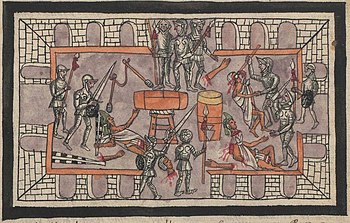massacre

A massacre is a mass murder under particularly cruel circumstances, a slaughter or blood bath , often in connection with motives such as hatred or revenge . The word is derived from the old French maçacre , "slaughterhouse". In sociology, this is understood to mean “mostly collective action aimed at the annihilation of non-combatants ” (civilians or disarmed soldiers).
In armed conflicts it is typically understood as the politically or ethnically motivated killing of civilians , soldiers or paramilitary forces after their surrender or after their town or village has surrendered. Massacres are therefore mass murders carried out by armed units without military necessity outside the actual war. They serve to spread terrorism or as a deterrent, or they are organized as a systematic act of revenge and punishment. Large-scale massacres of people selected based on their national, religious or ethnic group affiliation may constitute genocide .
In international law , more precisely defined terms such as genocide , war crimes or crimes against humanity are used because the term massacre has vague connotations and can therefore be more easily misused for propaganda purposes.
There are also massacres outside of war situations, for example in the excessive suppression of demonstrations and uprisings by state or state- affiliated actors or in pogroms by members of one (mostly ethnically or religiously defined) population group against another. What they have in common is that a typically numerically smaller but better armed group of perpetrators carries out lethal violence against a larger but defenseless and inescapably extradited group of victims. Another typical element is a special brutality that goes beyond the actual killing. B. the victims tortured or tortured before the killing or the corpses are still mutilated after the killing. Within the groups of perpetrators there is often a blood rush, mutual incitement to even greater violence. There is a kind of peer pressure : rather anxious or inhibited members of the collective often stand out in particular to demonstrate their affiliation. Massacres are favored by the expectation of impunity , as prevails in wars and civil wars, in the absence of constitutional structures or if state authorities have ordered the act themselves or at least tolerate it.
Colloquially, the word is used for civil criminal acts with similar consequences, such as rampages (example: “ school massacres ”) or terrorist attacks with a significant number of victims. However, this is not a massacre in the sociological or socio-psychological sense, since at least the individual perpetrators lack the collective element typical of massacres.
literature
- Jacques Sémelin: Elements of a grammar of the massacre. In: Mittelweg 36 , Volume 15 (2006), No. 6, pp. 18-40.
- Jacques Sémelin: Purge and Destroy. The political dimension of massacres and genocides (“Purifier et détruire”). Hamburger Edition, Hamburg 2007, ISBN 978-3-936096-82-8 .
- Wolfgang Sofsky : Treatise on violence. 3rd edition, S. Fischer Verlag, 2003.
- Christine Vogel (Hrsg.): Pictures of the horror. The media staging of massacres since the 16th century. Campus, Frankfurt am Main, New York 2006, ISBN 978-3-593-37953-1 ( Google digitized version , preview).
Individual evidence
- ↑ Jacques Semelin: elements of a grammar of the massacre. In: Mittelweg 36 , Volume 15 (2006), No. 6, p. 18.
- ↑ Wolfgang Sofsky: What type of person is behind the excesses in Algeria, Rwanda and Bosnia? The law of slaughter. In: Die Zeit , No. 15/1998 (April 2, 1998).